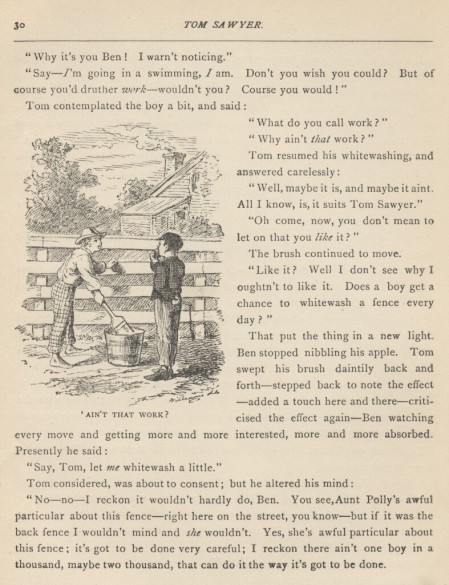In The Adventures of Tom Sawyer by Mark Twain we see an example of Playbor, as through salesmanship, Tom Sawyer convinces others to do his work for him and enjoy it.

Playbor
Playbor is a term I got from Wired but as you can see, it’s a widely used neologism which covers social participation, self-expression and the ideology of play in order to derive value. In truth the social aspect is easily present in events like Code4Pizza where smart developers and designers get together to build something. This is work but it’s enjoyed. There’s a very strong social element both in the cheer and good company but also in the end results which, for the most part, have a public service benefit as well as a possibility of commercialisation by the participants.
Games as Life
I’ve mentioned this before but Jesse Schell’s talk at DICE2010 illustrates the ‘gamification’ of life. Adding gaming elements to everything causes people to participate more and provides a reward mechanism which may only be worthless points but can be integrated into multiple levels of society.
Games for the Greater Good
Jane McGonigal’s TED talk on how we can use the millions of hours spent in playing games to solve tough world problems is another excellent example:
The game industry has spent the last 30 years optimizing two things: how to make people happy and how to inspire collaboration on really complex challenges…
Games support happiness … by giving us more satisfying work or concrete tasks that we can accomplish…. Studies have shown that playing a short game — having something concrete that you can accomplish — actually gives you the motivation, energy and optimism to go back and tackle real work.
Games as Loads
But when you’re asking someone to do this work, you’re putting a load upon them. Writing computer code is a tough mental activity and it’s surprising that some people do it for fun. But then some people do crosswords or Su Do Ku for fun as well as are these also not tough cognitive loads which must be managed? How can they be fun?
UX Magazine touched on this with this article:
A traditional human factors concept is the idea of loads. A load refers to how much work you are requiring. In human factors terminology, we talk about cognitive loads (thinking, memory), visual loads (perceiving, noticing), and motor loads (keyboard, mouse, pointing). When you are designing to make something easier or simpler, you want to lower these loads.
…
If users are trying to get a task done, then lowering the loads is what you want to do. But interestingly, when you lower all the loads you are also lowering engagement and entertainment. Think about gaming—a game is interesting and engaging because it creates loads on the user. Some games require good motor control, so they have a high motor load. Some games require visual acuity, and they have a high visual load. Some games require you to think or remember, and they have a high cognitive load. And some games increase more than one load; they might be both cognitively and visually challenging, for example.
…
So when you design for engagement or entertainment you might not want to lower all the loads.
Funemployment
I think we all should be striving for Funemployment – The condition of a person who takes advantage of being out of a job to have the time of their life. I’m not saying we should all give up the day job and mooch off the state handouts but we should be working towards a time when we are able to use our leisure constructively. To do what we want to do. I’m lucky enough that the work I’m doing now is not a million miles away from the work I was doing before they hired me to do this job. In the future I want to be employed for less hours but work for more hours – if you understand my meaning.
So, for the remainder of 2010, I’m going to be working to find ways where I can increase the amount of high value fun stuff in my life and reduce the amount of low value unfun stuff. And I’m happy to work with others to figure out what this all will turn out to be.